New Hetzner Server
| Posted: | 2009-06-10 14:14 |
|---|---|
| Tags: | Web, Virtulization, Hosting |
I bought a new Hetzner EQ4 Server last week. Here are the specs:
CPU
This is supposed to be a quad-core CPU but according to Wikipedia it has "Re-implemented Hyper-threading. Each of the four cores can process up to two threads simultaneously, so the processor appears to the OS as eight CPUs."
http://en.wikipedia.org/wiki/Intel_Core_i7
Here's the output of /proc/cpuinfo:
Debian-50-lenny-64-minimal:~# cat /proc/cpuinfo processor : 0 vendor_id : GenuineIntel cpu family : 6 model : 26 model name : Intel(R) Core(TM) i7 CPU 920 @ 2.67GHz stepping : 4 cpu MHz : 1600.000 cache size : 8192 KB physical id : 0 siblings : 8 core id : 0 cpu cores : 4 apicid : 0 initial apicid : 0 fpu : yes fpu_exception : yes cpuid level : 11 wp : yes flags : fpu vme de pse tsc msr pae mce cx8 apic sep mtrr pge mca cmov pat pse36 clflush dts acpi mmx fxsr sse sse2 ss ht tm pbe syscall rdtscp lm constant_tsc arch_perfmon pebs bts rep_good pni monitor ds_cpl vmx est tm2 ssse3 cx16 xtpr sse4_1 sse4_2 popcnt lahf_lm ida bogomips : 5350.87 clflush size : 64 cache_alignment : 64 address sizes : 36 bits physical, 48 bits virtual power management: processor : 1 vendor_id : GenuineIntel cpu family : 6 model : 26 model name : Intel(R) Core(TM) i7 CPU 920 @ 2.67GHz stepping : 4 cpu MHz : 1600.000 cache size : 8192 KB physical id : 0 siblings : 8 core id : 1 cpu cores : 4 apicid : 2 initial apicid : 2 fpu : yes fpu_exception : yes cpuid level : 11 wp : yes flags : fpu vme de pse tsc msr pae mce cx8 apic sep mtrr pge mca cmov pat pse36 clflush dts acpi mmx fxsr sse sse2 ss ht tm pbe syscall rdtscp lm constant_tsc arch_perfmon pebs bts rep_good pni monitor ds_cpl vmx est tm2 ssse3 cx16 xtpr sse4_1 sse4_2 popcnt lahf_lm ida bogomips : 5346.45 clflush size : 64 cache_alignment : 64 address sizes : 36 bits physical, 48 bits virtual power management: processor : 2 vendor_id : GenuineIntel cpu family : 6 model : 26 model name : Intel(R) Core(TM) i7 CPU 920 @ 2.67GHz stepping : 4 cpu MHz : 1600.000 cache size : 8192 KB physical id : 0 siblings : 8 core id : 2 cpu cores : 4 apicid : 4 initial apicid : 4 fpu : yes fpu_exception : yes cpuid level : 11 wp : yes flags : fpu vme de pse tsc msr pae mce cx8 apic sep mtrr pge mca cmov pat pse36 clflush dts acpi mmx fxsr sse sse2 ss ht tm pbe syscall rdtscp lm constant_tsc arch_perfmon pebs bts rep_good pni monitor ds_cpl vmx est tm2 ssse3 cx16 xtpr sse4_1 sse4_2 popcnt lahf_lm ida bogomips : 5346.45 clflush size : 64 cache_alignment : 64 address sizes : 36 bits physical, 48 bits virtual power management: processor : 3 vendor_id : GenuineIntel cpu family : 6 model : 26 model name : Intel(R) Core(TM) i7 CPU 920 @ 2.67GHz stepping : 4 cpu MHz : 1600.000 cache size : 8192 KB physical id : 0 siblings : 8 core id : 3 cpu cores : 4 apicid : 6 initial apicid : 6 fpu : yes fpu_exception : yes cpuid level : 11 wp : yes flags : fpu vme de pse tsc msr pae mce cx8 apic sep mtrr pge mca cmov pat pse36 clflush dts acpi mmx fxsr sse sse2 ss ht tm pbe syscall rdtscp lm constant_tsc arch_perfmon pebs bts rep_good pni monitor ds_cpl vmx est tm2 ssse3 cx16 xtpr sse4_1 sse4_2 popcnt lahf_lm ida bogomips : 5346.45 clflush size : 64 cache_alignment : 64 address sizes : 36 bits physical, 48 bits virtual power management: processor : 4 vendor_id : GenuineIntel cpu family : 6s model : 26 model name : Intel(R) Core(TM) i7 CPU 920 @ 2.67GHz stepping : 4 cpu MHz : 1600.000 cache size : 8192 KB physical id : 0 siblings : 8 core id : 0 cpu cores : 4 apicid : 1 initial apicid : 1 fpu : yes fpu_exception : yes cpuid level : 11 wp : yes flags : fpu vme de pse tsc msr pae mce cx8 apic sep mtrr pge mca cmov pat pse36 clflush dts acpi mmx fxsr sse sse2 ss ht tm pbe syscall rdtscp lm constant_tsc arch_perfmon pebs bts rep_good pni monitor ds_cpl vmx est tm2 ssse3 cx16 xtpr sse4_1 sse4_2 popcnt lahf_lm ida bogomips : 5346.44 clflush size : 64 cache_alignment : 64 address sizes : 36 bits physical, 48 bits virtual power management: processor : 5 vendor_id : GenuineIntel cpu family : 6 model : 26 model name : Intel(R) Core(TM) i7 CPU 920 @ 2.67GHz stepping : 4 cpu MHz : 1600.000 cache size : 8192 KB physical id : 0 siblings : 8 core id : 1 cpu cores : 4 apicid : 3 initial apicid : 3 fpu : yes fpu_exception : yes cpuid level : 11 wp : yes flags : fpu vme de pse tsc msr pae mce cx8 apic sep mtrr pge mca cmov pat pse36 clflush dts acpi mmx fxsr sse sse2 ss ht tm pbe syscall rdtscp lm constant_tsc arch_perfmon pebs bts rep_good pni monitor ds_cpl vmx est tm2 ssse3 cx16 xtpr sse4_1 sse4_2 popcnt lahf_lm ida bogomips : 5346.45 clflush size : 64 cache_alignment : 64 address sizes : 36 bits physical, 48 bits virtual power management: processor : 6 vendor_id : GenuineIntel cpu family : 6 model : 26 model name : Intel(R) Core(TM) i7 CPU 920 @ 2.67GHz stepping : 4 cpu MHz : 1600.000 cache size : 8192 KB physical id : 0 siblings : 8 core id : 2 cpu cores : 4 apicid : 5 initial apicid : 5 fpu : yes fpu_exception : yes cpuid level : 11 wp : yes flags : fpu vme de pse tsc msr pae mce cx8 apic sep mtrr pge mca cmov pat pse36 clflush dts acpi mmx fxsr sse sse2 ss ht tm pbe syscall rdtscp lm constant_tsc arch_perfmon pebs bts rep_good pni monitor ds_cpl vmx est tm2 ssse3 cx16 xtpr sse4_1 sse4_2 popcnt lahf_lm ida bogomips : 5346.46 clflush size : 64 cache_alignment : 64 address sizes : 36 bits physical, 48 bits virtual power management: processor : 7 vendor_id : GenuineIntel cpu family : 6 model : 26 model name : Intel(R) Core(TM) i7 CPU 920 @ 2.67GHz stepping : 4 cpu MHz : 1600.000 cache size : 8192 KB physical id : 0 siblings : 8 core id : 3 cpu cores : 4 apicid : 7 initial apicid : 7 fpu : yes fpu_exception : yes cpuid level : 11 wp : yes flags : fpu vme de pse tsc msr pae mce cx8 apic sep mtrr pge mca cmov pat pse36 clflush dts acpi mmx fxsr sse sse2 ss ht tm pbe syscall rdtscp lm constant_tsc arch_perfmon pebs bts rep_good pni monitor ds_cpl vmx est tm2 ssse3 cx16 xtpr sse4_1 sse4_2 popcnt lahf_lm ida bogomips : 5346.45 clflush size : 64 cache_alignment : 64 address sizes : 36 bits physical, 48 bits virtual power management:
Disk Configuration
There are two disks in a software RAID-1 configuration.
Debian-50-lenny-64-minimal:~# fdisk -l Disk /dev/sda: 750.1 GB, 750156374016 bytes 255 heads, 63 sectors/track, 91201 cylinders Units = cylinders of 16065 * 512 = 8225280 bytes Disk identifier: 0x000969c3 Device Boot Start End Blocks Id System /dev/sda1 1 523 4200997 fd Linux raid autodetect /dev/sda2 524 785 2104515 fd Linux raid autodetect /dev/sda3 786 91201 726266520 fd Linux raid autodetect Disk /dev/sdb: 750.1 GB, 750156374016 bytes 255 heads, 63 sectors/track, 91201 cylinders Units = cylinders of 16065 * 512 = 8225280 bytes Disk identifier: 0x0006e990 Device Boot Start End Blocks Id System /dev/sdb1 1 523 4200997 fd Linux raid autodetect /dev/sdb2 524 785 2104515 fd Linux raid autodetect /dev/sdb3 786 91201 726266520 fd Linux raid autodetect Disk /dev/md0: 4301 MB, 4301717504 bytes 2 heads, 4 sectors/track, 1050224 cylinders Units = cylinders of 8 * 512 = 4096 bytes Disk identifier: 0x00000000 Disk /dev/md0 doesn't contain a valid partition table Disk /dev/md1: 2154 MB, 2154954752 bytes 2 heads, 4 sectors/track, 526112 cylinders Units = cylinders of 8 * 512 = 4096 bytes Disk identifier: 0x00000000 Disk /dev/md1 doesn't contain a valid partition table Disk /dev/md2: 743.6 GB, 743696826368 bytes 2 heads, 4 sectors/track, 181566608 cylinders Units = cylinders of 8 * 512 = 4096 bytes Disk identifier: 0x00000000 Disk /dev/md2 doesn't contain a valid partition table
You can see this gives us 652G free space to play with:
Debian-50-lenny-64-minimal:~# df -h Filesystem Size Used Avail Use% Mounted on /dev/md2 688G 625M 652G 1% / tmpfs 4.0G 0 4.0G 0% /lib/init/rw udev 10M 96K 10M 1% /dev tmpfs 4.0G 0 4.0G 0% /dev/shm /dev/md1 2.0G 86M 1.9G 5% /boot
Memory
There is 8Gb RAM:
Debian-50-lenny-64-minimal:~# free -m
total used free shared buffers cached
Mem: 8001 84 7917 0 6 23
-/+ buffers/cache: 54 7947
Swap: 4102 0 4102
Debian-50-lenny-64-minimal:~#
Re-Installation with LVM
Note
I wasn't sure how to make an exist RAID partition into an LVM2 one so instead I re-installed the whole OS. This section is a tutorial you can follow to do the same.
Log into the Hetzner server, under Main Functions -> Servers you can select your server. Choose the rescue tab, choose 64bit and then activate request. Make a note of the password.
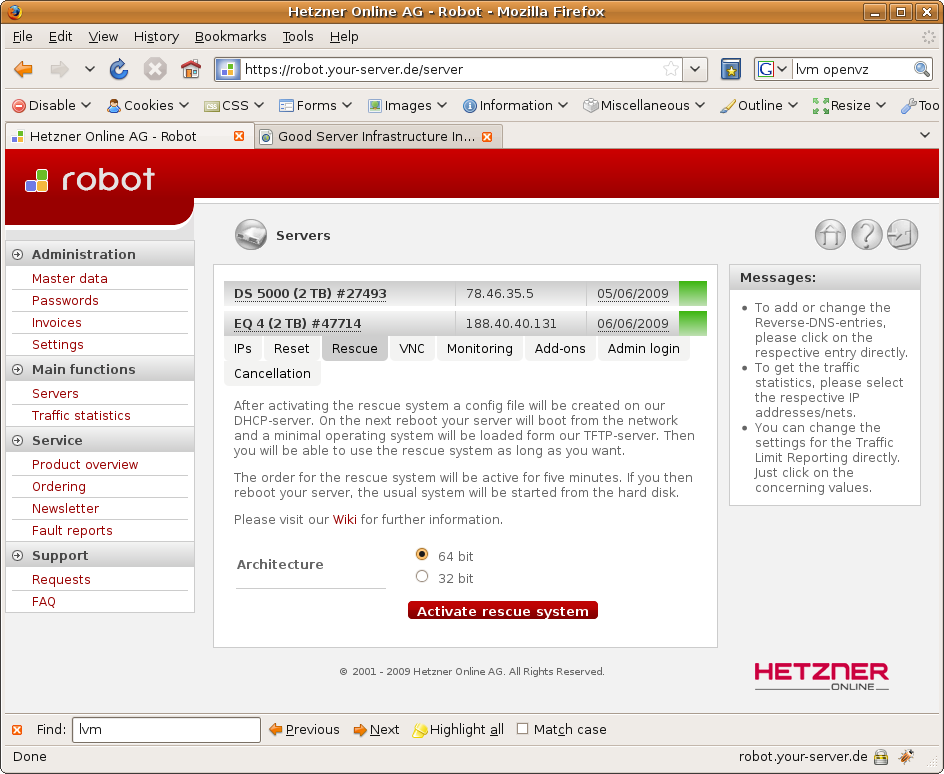
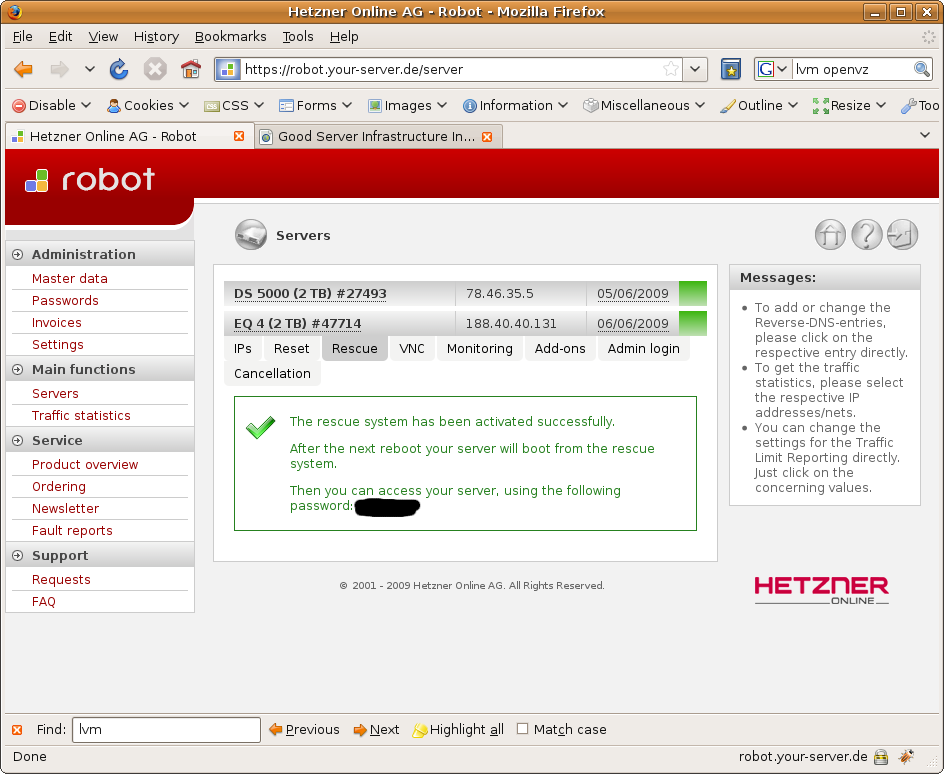
Now login to the server via SSH and restart it, the rescue system will boot. You've only got 5 mins though:
Debian-50-lenny-64-minimal:~# reboot The system is going down for reboot NOW!nny-64-minimal (pts/0) (Tue Jun 9 13 Debian-50-lenny-64-minimal:~# Connection to 188.40.40.131 closed by remote host. Connection to 188.40.40.131 closed. james@dirac:~$
If all goes well, after a minute or two you'll be able to sign into the rescue system. You can now SSH into the server but use the new password you've just been given. You'll see this unless you remove the entry from /home/james/.ssh/known_hosts or delete the file completely:
james@dirac:~$ ssh root@188.40.40.131 @@@@@@@@@@@@@@@@@@@@@@@@@@@@@@@@@@@@@@@@@@@@@@@@@@@@@@@@@@@ @ WARNING: REMOTE HOST IDENTIFICATION HAS CHANGED! @ @@@@@@@@@@@@@@@@@@@@@@@@@@@@@@@@@@@@@@@@@@@@@@@@@@@@@@@@@@@ IT IS POSSIBLE THAT SOMEONE IS DOING SOMETHING NASTY! Someone could be eavesdropping on you right now (man-in-the-middle attack)! It is also possible that the RSA host key has just been changed. The fingerprint for the RSA key sent by the remote host is 5a:ad:96:fe:28:53:eb:52:d6:bf:59:4b:26:51:7a:40. Please contact your system administrator. Add correct host key in /home/james/.ssh/known_hosts to get rid of this message. Offending key in /home/james/.ssh/known_hosts:18 RSA host key for 188.40.40.131 has changed and you have requested strict checking. Host key verification failed.
Then you can login:
Linux rescue 2.6.28 #3 SMP Mon Feb 2 15:21:43 CET 2009 x86_64 ------------------------------------------------------------------ Welcome to the Hetzner Rescue System. This Rescue System is based on Debian 5.0 (lenny) with a newer kernel. You can install software like in a normal system. To install a new operating system from one of our prebuilt images, run 'installimage' and follow the instructions. For more information take a look at http://wiki.hetzner.de ------------------------------------------------------------------ -bash: .oldroot/nfs/functions.sh: No such file or directory Hardware data: CPU Intel(R) Core(TM) i7 CPU 920 @ 2.67GHz CPU Intel(R) Core(TM) i7 CPU 920 @ 2.67GHz CPU Intel(R) Core(TM) i7 CPU 920 @ 2.67GHz CPU Intel(R) Core(TM) i7 CPU 920 @ 2.67GHz CPU Intel(R) Core(TM) i7 CPU 920 @ 2.67GHz CPU Intel(R) Core(TM) i7 CPU 920 @ 2.67GHz CPU Intel(R) Core(TM) i7 CPU 920 @ 2.67GHz CPU Intel(R) Core(TM) i7 CPU 920 @ 2.67GHz RAM 7975 MB Disk /dev/sda: 750.1 GB (=> 715 GIB) Disk /dev/sdb: 750.1 GB (=> 715 GIB) root@rescue ~ #
You then run the installimage command:
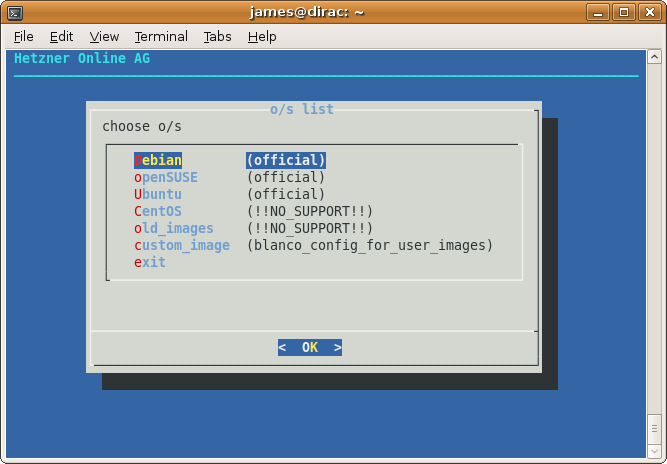
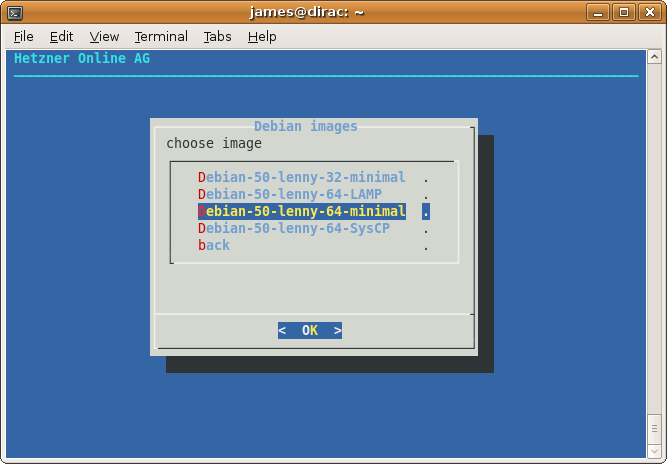
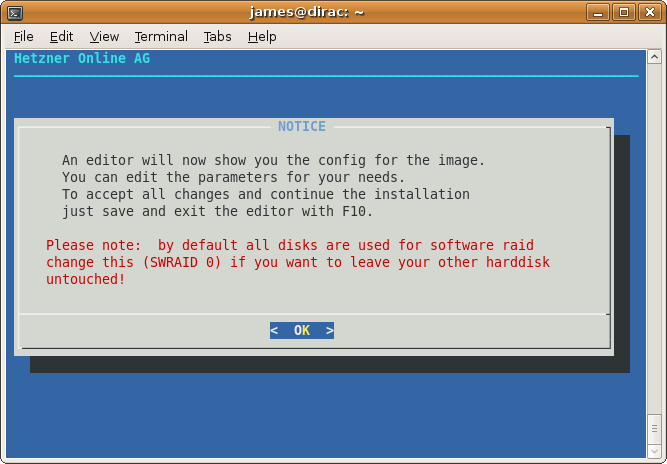
You'll want to edit a few settings:
HOSTNAME = fourier
The problem with the Hetzner setup is that you can't create a load of partitions and then create a single LVM volume group accross them all.
PART /boot ext3 512M boot PART lvm vg_root 50G LV vg_root root / ext3 20G LV vg_root swap swap ext3 8G LV vg_root tmp /tmp ext3 2G PART /vg0 ext3 50G PART /vg1 ext3 50G PART /vg2 ext3 50G PART /vg3 ext3 50G PART /vg4 ext3 50G PART /vg5 ext3 50G PART /vg6 ext3 50G PART /vg7 ext3 50G PART /vg8 ext3 50G PART /vg9 ext3 50G
You'll edit /etc/fstab after the install so that all these partitions aren't used and are instead put into one big volume group.
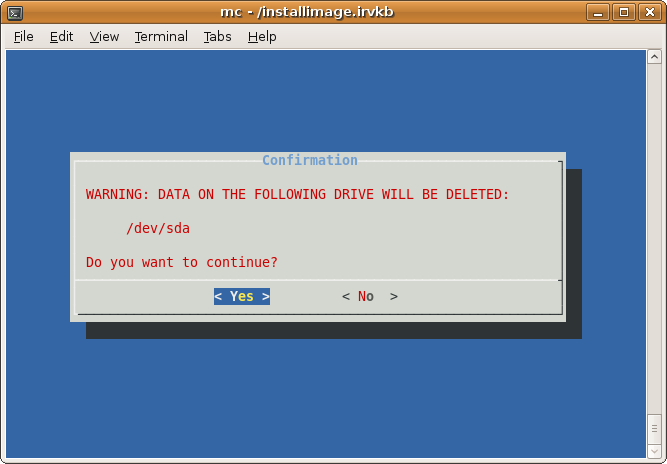
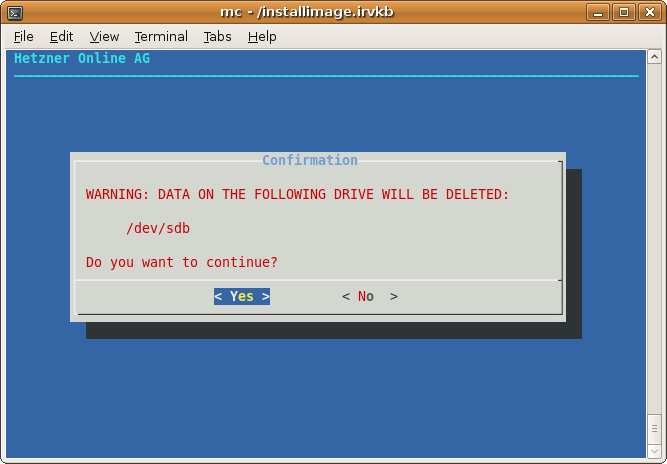
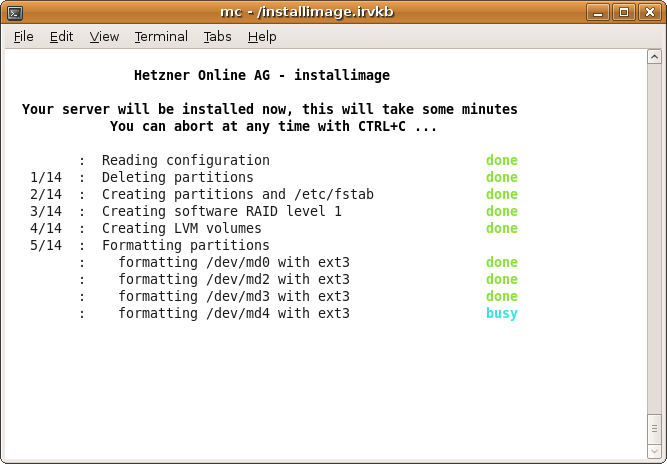
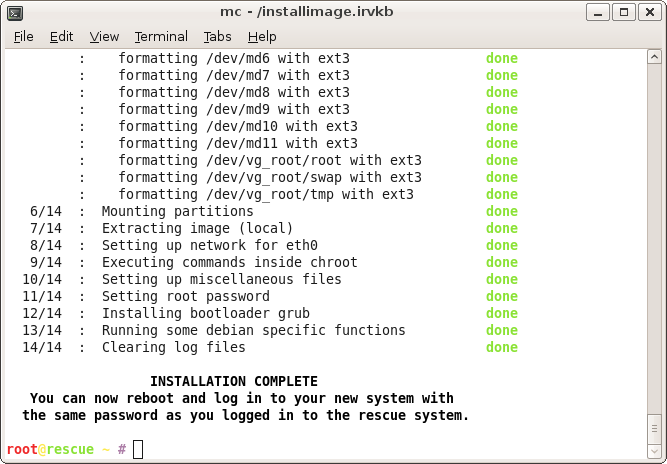
Now reboot:
root@rescue ~ # reboot Broadcast message from root@rescue (pts/0) (Tue Jun 9 14:04:17 2009): The system is going down for reboot NOW! root@rescue ~ # Connection to 188.40.40.131 closed by remote host. Connection to 188.40.40.131 closed. james@dirac:~$
Once again you'll need to remove the entry from /home/james/.ssh/known_hosts then you can login.
You'll need to use the same password you used when you logged into the rescue system, not the one you were originally given.
This time:
fourier:~# fdisk -l Disk /dev/sda: 750.1 GB, 750156374016 bytes 255 heads, 63 sectors/track, 91201 cylinders Units = cylinders of 16065 * 512 = 8225280 bytes Disk identifier: 0x0006627a Device Boot Start End Blocks Id System /dev/sda1 1 66 530144+ fd Linux raid autodetect /dev/sda2 67 6594 52436160 fd Linux raid autodetect /dev/sda3 6595 13122 52436160 fd Linux raid autodetect /dev/sda4 13123 91201 627169567+ 85 Linux extended /dev/sda5 13123 19650 52436159+ fd Linux raid autodetect /dev/sda6 19651 26178 52436159+ fd Linux raid autodetect /dev/sda7 26179 32706 52436159+ fd Linux raid autodetect /dev/sda8 32707 39234 52436159+ fd Linux raid autodetect /dev/sda9 39235 45762 52436159+ fd Linux raid autodetect /dev/sda10 45763 52290 52436159+ fd Linux raid autodetect /dev/sda11 52291 58818 52436159+ fd Linux raid autodetect /dev/sda12 58819 65346 52436159+ fd Linux raid autodetect /dev/sda13 65347 71874 52436159+ fd Linux raid autodetect Disk /dev/sdb: 750.1 GB, 750156374016 bytes 255 heads, 63 sectors/track, 91201 cylinders Units = cylinders of 16065 * 512 = 8225280 bytes Disk identifier: 0x000eda4d Device Boot Start End Blocks Id System /dev/sdb1 1 66 530144+ fd Linux raid autodetect /dev/sdb2 67 6594 52436160 fd Linux raid autodetect /dev/sdb3 6595 13122 52436160 fd Linux raid autodetect /dev/sdb4 13123 91201 627169567+ 85 Linux extended /dev/sdb5 13123 19650 52436159+ fd Linux raid autodetect /dev/sdb6 19651 26178 52436159+ fd Linux raid autodetect /dev/sdb7 26179 32706 52436159+ fd Linux raid autodetect /dev/sdb8 32707 39234 52436159+ fd Linux raid autodetect /dev/sdb9 39235 45762 52436159+ fd Linux raid autodetect /dev/sdb10 45763 52290 52436159+ fd Linux raid autodetect /dev/sdb11 52291 58818 52436159+ fd Linux raid autodetect /dev/sdb12 58819 65346 52436159+ fd Linux raid autodetect /dev/sdb13 65347 71874 52436159+ fd Linux raid autodetect Disk /dev/md0: 542 MB, 542769152 bytes 2 heads, 4 sectors/track, 132512 cylinders Units = cylinders of 8 * 512 = 4096 bytes Disk identifier: 0x00000000 Disk /dev/md0 doesn't contain a valid partition table Disk /dev/md1: 53.6 GB, 53694562304 bytes 2 heads, 4 sectors/track, 13109024 cylinders Units = cylinders of 8 * 512 = 4096 bytes Disk identifier: 0x00000000 Disk /dev/md1 doesn't contain a valid partition table Disk /dev/md2: 53.6 GB, 53694562304 bytes 2 heads, 4 sectors/track, 13109024 cylinders Units = cylinders of 8 * 512 = 4096 bytes Disk identifier: 0x00000000 Disk /dev/md2 doesn't contain a valid partition table Disk /dev/md3: 53.6 GB, 53694496768 bytes 2 heads, 4 sectors/track, 13109008 cylinders Units = cylinders of 8 * 512 = 4096 bytes Disk identifier: 0x00000000 Disk /dev/md3 doesn't contain a valid partition table Disk /dev/md4: 53.6 GB, 53694496768 bytes 2 heads, 4 sectors/track, 13109008 cylinders Units = cylinders of 8 * 512 = 4096 bytes Disk identifier: 0x00000000 Disk /dev/md4 doesn't contain a valid partition table Disk /dev/md5: 53.6 GB, 53694496768 bytes 2 heads, 4 sectors/track, 13109008 cylinders Units = cylinders of 8 * 512 = 4096 bytes Disk identifier: 0x00000000 Disk /dev/md5 doesn't contain a valid partition table Disk /dev/md6: 53.6 GB, 53694496768 bytes 2 heads, 4 sectors/track, 13109008 cylinders Units = cylinders of 8 * 512 = 4096 bytes Disk identifier: 0x00000000 Disk /dev/md6 doesn't contain a valid partition table Disk /dev/md7: 53.6 GB, 53694496768 bytes 2 heads, 4 sectors/track, 13109008 cylinders Units = cylinders of 8 * 512 = 4096 bytes Disk identifier: 0x00000000 Disk /dev/md7 doesn't contain a valid partition table Disk /dev/md8: 53.6 GB, 53694496768 bytes 2 heads, 4 sectors/track, 13109008 cylinders Units = cylinders of 8 * 512 = 4096 bytes Disk identifier: 0x00000000 Disk /dev/md8 doesn't contain a valid partition table Disk /dev/md9: 53.6 GB, 53694496768 bytes 2 heads, 4 sectors/track, 13109008 cylinders Units = cylinders of 8 * 512 = 4096 bytes Disk identifier: 0x00000000 Disk /dev/md9 doesn't contain a valid partition table Disk /dev/md10: 53.6 GB, 53694496768 bytes 2 heads, 4 sectors/track, 13109008 cylinders Units = cylinders of 8 * 512 = 4096 bytes Disk identifier: 0x00000000 Disk /dev/md10 doesn't contain a valid partition table Disk /dev/md11: 53.6 GB, 53694496768 bytes 2 heads, 4 sectors/track, 13109008 cylinders Units = cylinders of 8 * 512 = 4096 bytes Disk identifier: 0x00000000 Disk /dev/md11 doesn't contain a valid partition table Disk /dev/dm-0: 21.4 GB, 21474836480 bytes 255 heads, 63 sectors/track, 2610 cylinders Units = cylinders of 16065 * 512 = 8225280 bytes Disk identifier: 0x00000000 Disk /dev/dm-0 doesn't contain a valid partition table Disk /dev/dm-1: 8589 MB, 8589934592 bytes 255 heads, 63 sectors/track, 1044 cylinders Units = cylinders of 16065 * 512 = 8225280 bytes Disk identifier: 0x00000000 Disk /dev/dm-1 doesn't contain a valid partition table Disk /dev/dm-2: 2147 MB, 2147483648 bytes 255 heads, 63 sectors/track, 261 cylinders Units = cylinders of 16065 * 512 = 8225280 bytes Disk identifier: 0x00000000 Disk /dev/dm-2 doesn't contain a valid partition table
You can now unmount the /vg0, /vg1 etc partitions:
# umount /vg*
Edit /etc/fstab and comment out the lines with those partitions:
proc /proc proc defaults 0 0 none /dev/pts devpts gid=5,mode=620 0 0 /dev/md0 /boot ext3 defaults 0 0 # /dev/md1 belongs to LVM volume group 'vg_root' #/dev/md2 /vg0 ext3 defaults 0 0 #/dev/md3 /vg1 ext3 defaults 0 0 #/dev/md4 /vg2 ext3 defaults 0 0 #/dev/md5 /vg3 ext3 defaults 0 0 #/dev/md6 /vg4 ext3 defaults 0 0 #/dev/md7 /vg5 ext3 defaults 0 0 #/dev/md8 /vg6 ext3 defaults 0 0 #/dev/md9 /vg7 ext3 defaults 0 0 #/dev/md10 /vg8 ext3 defaults 0 0 #/dev/md11 /vg9 ext3 defaults 0 0 /dev/vg_root/root / ext3 defaults 0 0 /dev/vg_root/swap swap ext3 defaults 0 0 /dev/vg_root/tmp /tmp ext3 defaults 0 0
Now remove the directories:
# rm -r /vg[0-9]
Now initialise the physical volumes LVM will use:
# pvcreate /dev/md2 /dev/md3 /dev/md4 /dev/md5 /dev/md6 /dev/md7 /dev/md8 /dev/md9 /dev/md10 /dev/md11 Physical volume "/dev/md2" successfully created Physical volume "/dev/md3" successfully created Physical volume "/dev/md4" successfully created Physical volume "/dev/md5" successfully created Physical volume "/dev/md6" successfully created Physical volume "/dev/md7" successfully created Physical volume "/dev/md8" successfully created Physical volume "/dev/md9" successfully created Physical volume "/dev/md10" successfully created Physical volume "/dev/md11" successfully created
Now create a volume group. You can do this all one go by specifying all devices in the first command and not using the second or by creating a volume group and extending it:
fourier:/# vgcreate vg_data /dev/md2 /dev/md3 /dev/md4 /dev/md5 /dev/md6 /dev/md7 /dev/md8 Volume group "vg_data" successfully created fourier:/# vgextend vg_data/dev/md9 /dev/md10 Volume group name vg_data/dev/md9 has invalid characters fourier:/# vgextend vg_data /dev/md9 /dev/md10 Volume group "vg_data" successfully extended fourier:/# vgextend vg_data /dev/md11 Volume group "vg_data" successfully extended
Now check the setup:
fourier:/# vgscan Reading all physical volumes. This may take a while... Found volume group "vg_data" using metadata type lvm2 Found volume group "vg_root" using metadata type lvm2
We want to create a different logical volume for each virtual machine so that we can take snapshots of virtual machines indivdually.
I'm writing separate tutorials on configuring the OS and setting up OpenVZ, just drop me an email if you want the first drafts.
If you have a problem and need to mount an LVM volume via a rescue disk you can do this:
root@rescue /mnt # lvdisplay | grep "LV Name" LV Name /dev/vg_root/root LV Name /dev/vg_root/swap LV Name /dev/vg_root/tmp root@rescue /mnt # vgchange -a y vg_root 3 logical volume(s) in volume group "vg_root" now active root@rescue /mnt # mount /dev/vg_root/root /mnt/test/
That's it so far!
Update 2009-08-31: A few people have asked why I've used so many physical partitions instead of just one. The answer is so that if I ever want to re-arrange the physical partitions I stand a good chance of being able to do so by moving data around to other partitions. If I had one partition and wanted to change the structure I wouldn't have any other partitions to move the data to so I would be stuck with the initial configuration. The reason for a large number of partitions is that the more you have, the more flexibility you have to start with and since they can all be grouped into one volume group or one logical volume anyway there is no harm in doing so. Do people think this is a sensible approach? James.